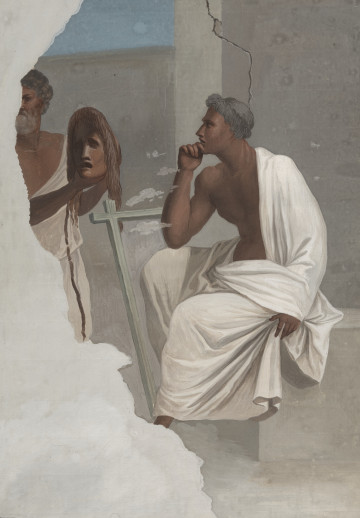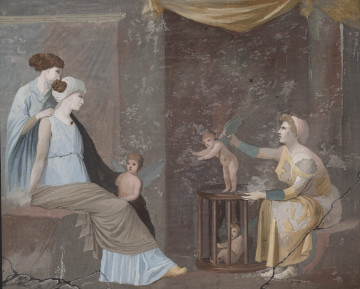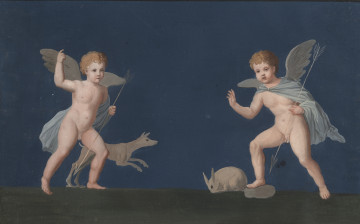
Poet discussing his poem
18th-19th century
Castle Museum in Łańcut
Part of the collection: Painting and drawing
Pompeian style painting „A scene from a theatre play, most likely” This painting, from the former collection of the Lubomirscy family, commissioned by duchess Lubomirska (listed in the castle inventory of 1802), shows a scene from a theatre play – three women in long dresses – one is sitting, holding a goldfish, another is writing something on a podium, on which the head of Medusa is resting, the third in the back is holding a thurible (?) in her hands. A grey wall, depicted precisely along with the texture of the plaster, forms the background. This is a copy of a painting discovered at a house overflown with lava and buried in volcanic ash, from Herculaneum. The explosion of Vesuvius took place in the year 79 AD, and both covered cities, Pompeii and Herculaneum, were discovered in the 1780s; since then, painting referred to as being in Pompeian style, became very popular among fashionable aristocracy. Four styles of Pompeian painting were distinguished between. Naturally, ”apart from these styles” so to speak, painting did develop that depicted still life to decorate dining rooms, made up of birds, fruit, fish or vessels of water. Beside these, one sees portraits of house inhabitants painted directly on the walls. The painting from Łańcut, ordered by duchess Lubomirska, is a decoration of the Chinese Apartment in the first floor of the castle, or actually the Pompeian Room at this apartment..
Author / creator
Dimensions
height: 46.5 cm, width: 33 cm
Object type
Painting and drawing
Technique
gouache
Material
wood, paper
Origin / acquisition method
decyzja administracyjna
Creation time / dating
Creation / finding place
Owner
Castle Museum in Łańcut
Identification number
Location / status

18th-19th century
Castle Museum in Łańcut

18th-19th century
Castle Museum in Łańcut

18th-19th century
Castle Museum in Łańcut
DISCOVER this TOPIC
Museum of King Jan III's Palace at Wilanów
DISCOVER this PATH
Educational path